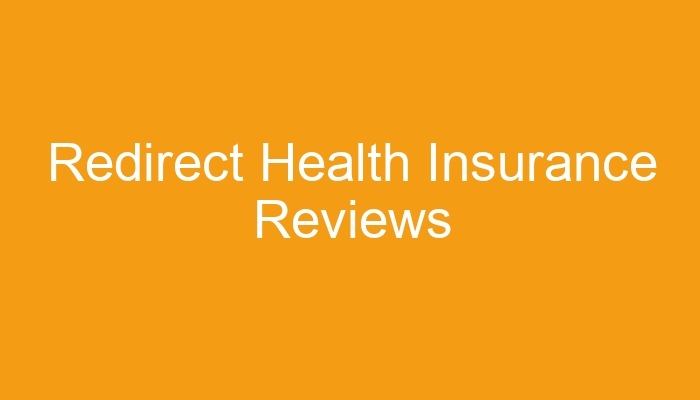Are you tired of sifting through endless health insurance options, only to find that most plans fall short of your needs? Enter Redirect Health Insurance. This innovative healthcare model promises a simplified approach to coverage and claims management.
But is it the right fit for you? In this article, we’ll dive into Redirect Health Insurance reviews and explore its pros and cons. Plus, we’ll offer up some alternatives to consider if Redirect doesn’t quite hit the mark. So sit back, relax, and let’s get started on finding the perfect health insurance plan for you!
What is Redirect Health Insurance?
Redirect Health Insurance is an innovative healthcare solution that offers a simplified, affordable and hassle-free approach to health insurance. It’s designed for individuals, families and employers who want to take control of their healthcare costs while still receiving quality care.
Instead of traditional insurance plans, Redirect Health Insurance operates on a subscription-based model where members pay a monthly fee for access to primary care services through their network of providers. This includes unlimited office visits, lab tests, prescription medications and more.
One unique aspect of Redirect Health Insurance is its focus on preventative care. Members receive regular check-ups and screenings to detect any potential health issues early on before they become more serious (and expensive) problems down the road.
Another key feature is its use of technology to streamline the healthcare experience. Members can easily schedule appointments online or via mobile app, communicate with doctors through secure messaging and even have virtual consultations when appropriate.
Redirect Health Insurance provides an alternative option for those seeking affordable yet comprehensive coverage that prioritizes preventive care and utilizes modern technology for a better patient experience.
The Pros and Cons of Redirect Health Insurance
Redirect Health Insurance is a unique healthcare plan that has both advantages and disadvantages. One of the most significant pros of this insurance policy is its affordability. It offers low monthly premiums and out-of-pocket costs, making it an attractive option for people who are on a tight budget.
Another advantage of Redirect Health Insurance is its flexibility in choosing healthcare providers. You can choose from a network of doctors, specialists, and clinics to receive care without worrying about deductibles or co-payments.
However, one downside to Redirect Health Insurance is that it may not cover all your medical expenses if you require specialized care or treatment outside the network. Moreover, there may be longer wait times to see certain healthcare professionals.
Additionally, some people might find the lack of coverage for pre-existing conditions as another disadvantage when using Redirect Health Insurance. This means that if you have any existing health problems before enrolling in the plan, they may not be covered by your insurance provider.
Redirect Health Insurance has both upsides and downsides depending on your individual needs and preferences when it comes to healthcare plans. It’s essential to weigh these factors carefully before deciding whether this type of insurance policy is right for you or not.
Alternatives to Redirect Health Insurance
If you’re considering health insurance options, it’s important to explore all of your choices. Redirect Health Insurance may not be the right fit for everyone, so here are some alternative options to consider.
One option is traditional health insurance provided by large companies or government programs like Medicare and Medicaid. These policies typically offer more coverage but also come with higher premiums.
Another alternative is a high-deductible health plan (HDHP) paired with a Health Savings Account (HSA). This type of plan often has lower monthly premiums but requires a higher out-of-pocket expense before coverage kicks in.
Short-term health insurance plans are also an option for those looking for temporary coverage while in between jobs or waiting for other healthcare benefits to begin.
There’s direct primary care (DPC), which operates on a membership model where patients pay a monthly fee directly to their provider. DPC offers unlimited access to healthcare services without any additional costs per visit.
When choosing the best health insurance option, it’s vital to match your specific needs and budget with the available alternatives.
How to Choose the Right Health Insurance for You
Choosing the right health insurance for yourself can be a daunting task. With so many options available, it is essential to understand your needs and budget. Here are some tips on how to choose the right health insurance for you:
1. Assess Your Needs
Before choosing a plan, assess your current healthcare needs and future requirements. Consider factors like age, medical history, family size, lifestyle choices and pre-existing conditions.
2. Evaluate Costs
Compare costs of different plans including monthly premiums, copays, deductibles and out-of-pocket expenses.
3. Check Coverage Options
Check if your preferred doctors or hospitals are in-network with the plan you’re considering. Review coverage options such as prescription drugs or maternity care that may be important to you.
4. Research Plan Providers
Research reputable providers who offer quality customer service support along with affordable rates.
5. Read Reviews from Customers
Read reviews from customers who have used the same plans earlier which helps in identifying whether they were satisfied with their experience or not.
By taking all these factors into account while selecting a health insurance plan can help ensure that you have adequate coverage at an affordable price tailored specifically to your unique situation..
Conclusion
Redirect Health Insurance is a great option for those who prioritize cost-effectiveness and convenience. Its unique approach to healthcare can save individuals and businesses money while still providing quality medical care.
However, it may not be the best fit for everyone. It’s important to weigh the pros and cons before making any decisions about health insurance coverage.
Remember that there are alternatives out there such as traditional health insurance plans or even direct primary care memberships. Ultimately, the right choice will depend on your individual needs and preferences.
No matter what you decide, make sure to do thorough research and compare different options before committing to any plan. Your health is too important to take lightly!

